Letter from Gaza. "I'm 18, and already 4 wars old". Carta desde Gaza. "Tengo 18 años, he vivido 4 guerras". ENG ESP
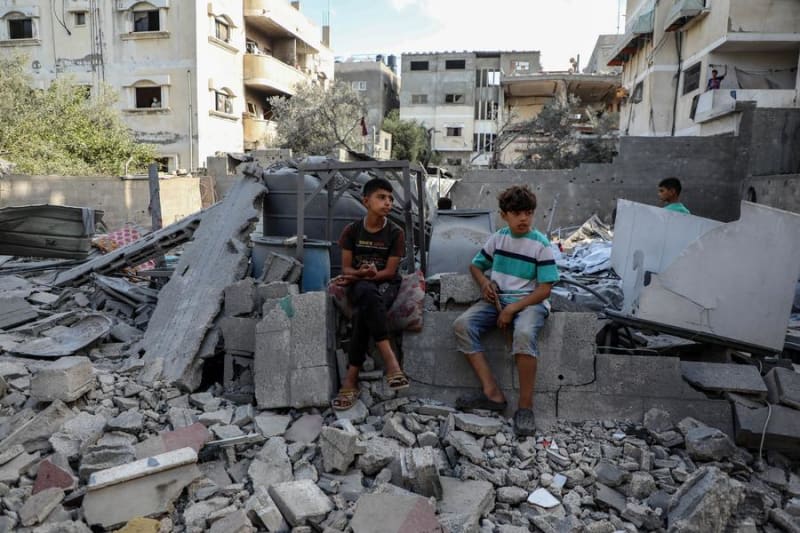
ENGLISH
Letter from Gaza: I'm 18, and already 4 wars old.
A letter of a quiet yet unyielding girl who dreams of a better future and believes that hope is stronger than war
GAZA, Oct. 5 2025 -- My name is Rahaf Radi. I am 18 years old, a 12th-grade student, and I am writing to you from a small tent in a town called al-Zawaida in central Gaza.
It is currently nighttime. Distant booms and occasional explosions still punctuate the darkness, but writing to you -- those of you who care about what's happening here -- offers me a moment of solace amid the chaos.
I fell in love with writing when I was a child. What I write today is more than a letter; it is a testimony -- the story of our life and a fragment of what we endure here. From an early age, I have looked at life with a measure of hope. Even growing up surrounded by restrictions and hardship, I have always searched for glimmers of light.
I am quiet by nature -- I love to read, to reflect -- but inside me there is also a rebellious spirit, unwilling to accept the chains of this reality. The paradox may sound strange: serenity gives me strength, while rebellion compels me toward change.
In my 18 years, I have lived through four wars. I still remember the pounding of airstrikes in 2014, when I was still a child, and the suffocating shelter rooms where we hid. In 2019 and 2021, I was older, and I saw death creep closer to our homes as each conflict broke out. In 2023, violence erupted again and escalated into the war that has yet to end. To grow up under such relentless violence would be unimaginable in other places; yet here, it has become ordinary.
Today, my family and I squeeze into a tent just a few meters wide. We have lost our home. What breaks my heart most, though, is that I have lost my school. Some of the teachers were killed in the bombings. Many of my classmates have disappeared without a trace. At first, the school was converted into a shelter for the displaced. Not long after, it was leveled. Sitting at a desk in a real classroom is a pipe dream now.
In more than a year of displacement, the memories of school have never left me. I can still see myself waking up early, buttoning the blue uniform, and walking with friends through Gaza's crowded streets. We laughed all the way, trading innocent visions of a luminous future. School was more than a place of learning; it was a second home, a stage for ambition.
The day the school building was bombed into rubble, a part of me was taken with it. My childhood collapsed right before my eyes. I cried, but I swore that destruction would not deprive me of my right to learn.
I built a "desk" from scraps of wood salvaged from the ruins. On it, I place the few books I have -- hand-me-downs from older students, some torn but still legible. I study by candlelight, or with a small battery lamp. The air inside the tent is stifling; the roar of fighter jets never leaves the skies. Still, when I open my books, I try to seal myself inside another world.
I dream of becoming a journalist not only because I love writing, but also because journalism seems to be the only way to speak for my generation. I want to tell the world what it means to live here -- to write not just of sorrow, but of defiance and hope; to tell the stories of children, women and young people who refuse to surrender to despair. I want to be a witness, not merely a victim.
The Gaza I knew as a child was alive with color: its bustling markets, the scent of the sea, the streets crowded with students. The Gaza I see now is wounded, hollow: houses gutted, streets emptied, dreams postponed -- if not yet shattered. However, when I sit before the sea and watch the waves, I feel that the city is not dead. Like us, it has the power to rise again.
I know that day will not come easily, but I am determined to show that Palestinians -- the people of this land, the heirs to its history -- do not vanish. Even when bodies are buried, the dreams endure. That faith gives me the strength to face my fear each time I hear the death of a friend or relative, each time an explosion rattles the air not far from where I am. I rein in my terror with prayer, with quiet talks with my mother and friends, with words scribbled into notebooks.
Since the latest war began, I have been keeping a diary. I wrote down moments of fear, the sudden hush when the bombing pauses, children's tears and the fragile bursts of joy we manage to create. I write to preserve memory, believing that if I survive, one day I will place these pages in the hands of my own children. I will tell them that whatever success I would achieve did not come from nothing -- it was forged in the long patience of life under fire.
For me, learning and writing are not merely a path to a certificate or a job. They are a means of survival -- what convinces me that my life has meaning, and that my future may still unfold differently from my present.
I picture myself years from now, a journalist known beyond Gaza, traveling the world, telling my city's story in my voice and on my page -- proof that Palestinians, whatever the devastation they endure, remain capable of dreaming, of building.
This is my letter from Gaza. The letter of a quiet yet unyielding girl who dreams of a better future and believes that hope is stronger than war. And I trust that these words will stand as witness: that the Palestinian dream never dies.
Note: Rahaf Radi is an 18-year-old girl in Gaza. She was a student at Roqaya Secondary School in Gaza City before the Gaza war.
ESPAÑOL
Carta desde Asia Occidental: Tengo 18 años y ya he vivido cuatro guerras.
Una carta de una chica tranquila pero inquebrantable que sueña con un futuro mejor y cree que la esperanza es más fuerte que la guerra.
GAZA, 5 de octubre de 2025
Me llamo Rahaf Radi. Tengo 18 años, soy estudiante de bachillerato y les escribo desde una pequeña tienda de campaña en un pueblo llamado al-Zawaida, en el centro de Gaza.
Es de noche. Explosiones lejanas y ocasionales aún marcan la oscuridad, pero escribirles a ustedes, a quienes les importa lo que sucede aquí, me ofrece un momento de consuelo en medio del caos. Me enamoré de la escritura de niña.
Lo que escribo hoy es más que una carta; es un testimonio: la historia de nuestra vida y un fragmento de lo que soportamos aquí. Desde muy joven, he visto la vida con cierta esperanza. Incluso habiendo crecido rodeada de restricciones y dificultades, siempre he buscado destellos de luz. Soy tranquila por naturaleza —me encanta leer, reflexionar—, pero dentro de mí también hay un espíritu rebelde, reacia a aceptar las cadenas de esta realidad. La paradoja puede sonar extraña: la serenidad me da fuerza, mientras que la rebelión me impulsa al cambio. En mis 18 años, he vivido cuatro guerras.
Todavía recuerdo el estruendo de los bombardeos en 2014, cuando aún era una niña, y las sofocantes habitaciones de los refugios donde nos escondíamos. En 2019 y 2021, ya mayor, vi cómo la muerte se acercaba sigilosamente a nuestros hogares con cada conflicto. En 2023, la violencia estalló de nuevo y se intensificó hasta convertirse en la guerra que aún no ha terminado. Crecer bajo una violencia tan implacable sería inimaginable en otros lugares; sin embargo, aquí, se ha vuelto algo cotidiano.
Hoy, mi familia y yo nos apiñamos en una tienda de campaña de apenas unos metros de ancho. Hemos perdido nuestro hogar. Pero lo que más me rompe el corazón es haber perdido mi escuela. Algunos profesores murieron en los bombardeos. Muchos de mis compañeros han desaparecido sin dejar rastro. Al principio, la escuela se convirtió en un refugio para desplazados. Poco después, fue arrasada.
Sentarme en un pupitre en un aula de verdad es ahora una quimera. En más de un año de desplazamiento, los recuerdos de la escuela nunca me han abandonado. Todavía me veo madrugando, abotonándome el uniforme azul y caminando con amigos por las concurridas calles de Gaza. Nos reíamos todo el camino, compartiendo inocentes visiones de un futuro brillante. La escuela era más que un lugar de aprendizaje; era un segundo hogar, un escenario para la ambición.
El día que el edificio de la escuela fue bombardeado hasta quedar reducido a escombros, una parte de mí se lo llevó. Mi infancia se derrumbó ante mis ojos. Lloré, pero juré que la destrucción no me privaría de mi derecho a aprender.
Construí un "escritorio" con trozos de madera rescatados de las ruinas. Sobre él, coloco los pocos libros que tengo: libros heredados de estudiantes mayores, algunos rotos pero aún legibles. Estudio a la luz de las velas o con una pequeña lámpara de pilas. El aire dentro de la tienda es sofocante; el rugido de los aviones de combate no se aleja del cielo. Aun así, cuando abro mis libros, intento aislarme en otro mundo.
Sueño con ser periodista no solo porque me encanta escribir, sino también porque el periodismo parece ser la única forma de hablar por mi generación. Quiero contarle al mundo lo que significa vivir aquí: escribir no solo sobre el dolor, sino también sobre la resistencia y la esperanza; contar las historias de niños, mujeres y jóvenes que se niegan a rendirse a la desesperación.
Quiero ser testigo, no solo víctima. La Gaza que conocí de niña rebosaba de color: sus mercados bulliciosos, el aroma del mar, las calles abarrotadas de estudiantes. La Gaza que veo ahora está herida, vacía: casas destruidas, calles vacías, sueños pospuestos, si no destrozados. Sin embargo, cuando me siento frente al mar y observo las olas, siento que la ciudad no está muerta.
Como nosotros, tiene el poder de resurgir. Sé que ese día no llegará fácilmente, pero estoy decidida a demostrar que los palestinos —la gente de esta tierra, los herederos de su historia— no desaparecen. Incluso cuando los cuerpos son enterrados, los sueños perduran. Esa fe me da la fuerza para afrontar el miedo cada vez que oigo la muerte de un amigo o familiar, cada vez que una explosión sacude el aire no muy lejos de donde estoy.
Controlo mi terror con la oración, con conversaciones tranquilas con mi madre y amigos, con palabras garabateadas en cuadernos. Desde que comenzó la última guerra, he estado escribiendo un diario. Escribí momentos de miedo, el silencio repentino al detenerse el bombardeo, las lágrimas de los niños y los frágiles estallidos de alegría que logramos crear. Escribo para preservar la memoria, creyendo que si sobrevivo, un día dejaré estas páginas en manos de mis propios hijos. Les diré que cualquier éxito que alcanzara no surgió de la nada; se forjó en la larga paciencia de la vida bajo fuego.
Para mí, aprender y escribir no son solo un camino hacia un certificado o un trabajo. Son un medio de supervivencia; lo que me convence de que mi vida tiene sentido y de que mi futuro aún puede ser diferente a mi presente.
Me imagino dentro de unos años, como una periodista conocida más allá de Gaza, viajando por el mundo, contando la historia de mi ciudad con mi voz y en mi página: prueba de que los palestinos, a pesar de la devastación que sufren, siguen siendo capaces de soñar, de construir.
Esta es mi carta desde Gaza. La carta de una chica tranquila pero inquebrantable que sueña con un futuro mejor y cree que la esperanza es más fuerte que la guerra. Y confío en que estas palabras perduren como testimonio de que el sueño palestino nunca muere.
Nota: Rahaf Radi es una joven de 18 años de Gaza. Estudió en la Escuela Secundaria Roqaya de la ciudad de Gaza antes de la guerra de Gaza.
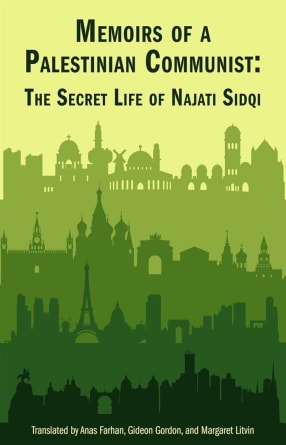
Memoirs of a Palestinian Communist, Najati Sidq. Memorias de un comunista palestino. ENG ESP
Publicado hoy.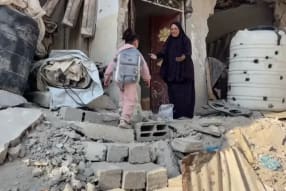
“Epistemicide” in Gaza. Breaking the Chain of Knowledge. Epistemicidio en Gaza. Romper la cadena del conocimiento. ENG ESP
Publicado ayer.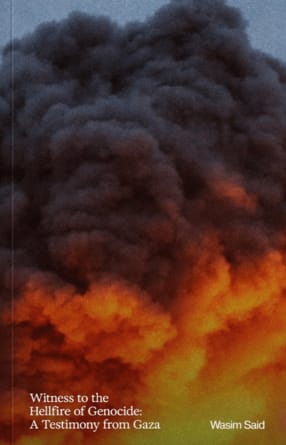
Witness to the Hellfire of Genocide: A Testimony from Gaza. Wasim Said. Desde Gaza, Testigo del Infierno del Genocidio. ENG ESP
Publicado hace 5 días.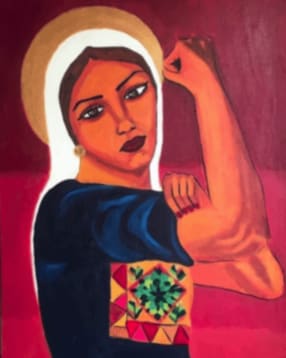
Malak Mattar. Gaza Artist and Survivor. Artista gazaití, y sobreviviente. ESP ENG
Publicado hace 14 días.
"Cuando el mundo duerme". Ensayo. Francesca Albanese
Publicado el 29 de enero.
'Fire in Every Direction' Tareq Baconi ENG ESP
Publicado el 29 de enero.
"American doctor" documentary, documental ENG ESP
Publicado el 25 de enero.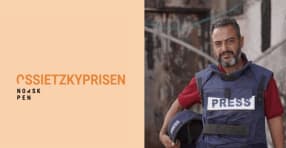
Ossietzky Prize to Palestinian journalist Sami Abu Salem. Premio Ossietzky al periodista palestino Sami Abu Salem. ENG ESP
Publicado el 25 de enero.Ver más / See more


